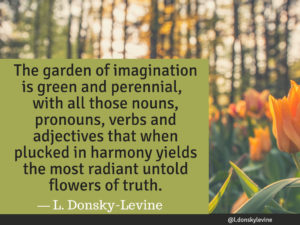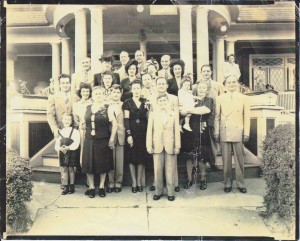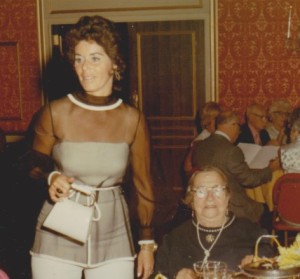“I think there are two types of writers: the architects and the gardeners. The architects plan everything ahead of time, like an architect building a house. They know how many rooms are going to be in the house, what kind of roof they’re going to have, where the wires are going to run, what kind of plumbing there’s going to be. They have the whole thing designed and blueprinted out before they even nail the first board up. The gardeners dig a hole, drop in a seed and water it. They kind of know what seed it is, they know if planted a fantasy seed or mystery seed or whatever. But as the plant comes up and they water it, they don’t know how many branches it’s going to have, they find out as it grows. And I’m much more a gardener than an architect.”
— George R. R. Martin
How we see ourselves creatively has always been a fascinating topic for me. So when I found this excerpt from one of the author’s interviews, I knew right away which camp I belonged. I saw the black and white of it. The explicitness versus the ambiguity. And although these approaches couldn’t be any more different, when it comes to creating, we all start at the same place: the beginning.
For a writer it’s with a blank sheet of paper. For an artist an empty canvas, for a sculptor a lump of clay, and for a novice literary gardener who hadn’t a clue what she was doing … it was nothing more than the dirt beneath her feet. That and vision, I thought when my husband and I first bought the house of our dreams. A house which, by the way, didn’t start out in that blissful condition of completeness nor the small runway strip of garden trailing up the walkway. Both needed loving hands to resuscitate them back to life and a healthy sense of humor which I obviously must have had gazing beyond the rusted pipes, the chipped ceilings, the rotted roof, the leaking swimming pool and the jungle of weeds crawling about—because I didn’t turn and run.
In no time at all I threw myself into the world of gardening. I learned its lingo. I adopted its blueprints, its perfectionisms in order to replicate what Home and Garden and Pinterest promised me. I even suited up in the requisite attire—floppy Aunt Bea hat, Nitrile gloves, gobs of sunscreeen—just to demonstrate my newfound devotion. But devotion wasn’t enough. As plants began dying left and right I realized no matter how quickly I wanted my garden to transform, it was a process. A learning curve. And ridiculously expensive.
I was by no means dripping in money. We had used all our savings as a down payment, so you can imagine the toll it took. But, back then, I was naive and undeterred. Back then my knees didn’t pop like the Tin Man’s. I wanted Monet’s garden no matter what it cost. Like I said … I was naive and undeterred.
Days after work and on weekends when I wasn’t shuttling the children to and from soccer practice and various playdates, I weeded. Up to my eyeballs in compost, I dug. I batted away flies that wanted a piece of me for lunch while watering my charges under a brutal ninety-degree Floridian sun. Weeks turned into months and months turned into years. And as the periwinkles took flight, as the pansies danced their way up to my front door, as the bougainvilleas exploded in purpley-purples up their filigree ladder, I continued to work the garden. Almost every day. Not because I had to anymore, but because I wanted to be surrounded by the comforting silence that had blossomed into a better marriage than the one I had; which was crumbling into ruins.
At a time when I’d hoped my life would take that much-needed uphill turn, the fate gods had different plans for me. So it was there, in the garden, I allowed myself to sink into myself. To reach that sacrosanct place of wounded splendor where judgment, broken hearts, crying babies and monsters did not exist.
Even if it meant for just a little while.
Eventually we got divorced. We sold the house. It wasn’t something that I wanted to do. I had visions of growing old in that house, creating family traditions and watching a life—my life—flourish all around me. But because the financial burden was simply too great for what little I was earning at the time, this place I called home would now be replaced by someone else’s vision. Someone else’s universe.
Yes, I was moving away, but not moving on. That would take a little bit longer.
The decision to write was never a conscious one. Nor did it come to me then. It came a few years later, out of need. The kind of need that feels like you’re drowning and flailing against a silent blue terror. And I knew, just knew if I didn’t at least try to give voice to this feeling, I would be lost.
Why one writes I believe is a question answered differently by everyone. To become famous, to affect change, to alter the course of humanity, to heal those bleeding wounds, to record our stories are the foundations for every work of art.
“We also write to heighten our own awareness of life,” said Anais Nin. “We write to lure and enchant and console others. We write to serenade our lovers. We write to taste life twice, in the moment and in retrospection. We write, like Proust, to render all of it eternal, and to persuade ourselves that it is eternal. We write to be able to transcend our life, to reach beyond it. We write to teach ourselves to speak with others, to record the journey into the labyrinth. We write to expand our world when we feel strangled, or constricted, or lonely.”
And if we don’t write …
“You are going to feel like hell if you never write the stuff that is tugging on the sleeves in your heart — your stories, visions, memories, songs: your truth, your version of things, in your voice,” Anne Lamott observed. “That is really all you have to offer us, and it’s why you were born.”
They say those authors we read are those influences that tell us who we are, that help to define us as writers. And I believe that’s true. At one time or another we are the students and they are the teachers.
In my wildest dreams I never imagined myself a gardener. Nor a writer. And much like gardening, a writer’s life is a lonely one. We’re left to our own devices, endless hours at a time. Creating worlds in which we sit day after day, sometimes struggling for the words to come, sometimes not. Typing and trashing, sulking and laughing, drinking lots and lots of coffee, committed and bound — we’re a unique tribe. It’s so goddamn hard to bare all to a sea of nameless faces without wanting to curl up in a ball and die. I can’t tell you how many times I’ve wanted to give up. How many times I’ve wanted to scream at the air like a motherfucker! The truth is … it’s so many I’ve stopped counting. And yet, there I am. Every morning. Without fail. A graduate from the Glutton-For-Punishment University in front of that same white screen flashing that same reminder: let’s get busy!
And so I do.
* * * *








